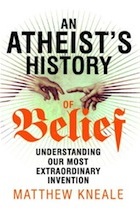Religion
Related: About this forumAn Atheist's History of Belief by Matthew Kneale – review
Religions are viewed as little more than conspiracies practised by confidence tricksters in this complacent history of faith

An Atheist's History of Belief: Understanding Our Most Extraordinary Invention
by Matthew Kneale
Tom Holland
The Guardian, Thursday 10 October 2013 04.00 EDT
At the heart of the Christian faith lies a stupefying paradox. An eternal and uncreated deity, so Christians believe, was born of a human mother, and entered the flow of time. Why, though, had this miraculous rupturing of history happened precisely when and where it did? Some 300 years after the lifetime of Christ, a Palestinian bishop by the name of Eusebius provided what would long serve Christians as the definitive answer. It was no accident, he argued, that the universal empire of Rome had been established just in time for Jesus to be born into it. "For no one could deny that this synchronicity was arranged by God."
In time, though, historians raised within the Christian tradition would indeed come to deny it. When Edward Gibbon analysed the emergence of Christianity, he paid lip-service to the notion of divine providence, only to sneer at it behind its back. The historian pledged to trace the progress of religion, he explained in his habitual tone of irony, was charged with a melancholy duty. "He must discover the inevitable mixture of error and corruption … contracted in a long residence upon Earth, among a weak and degenerate race of beings." There could be no place, in the pages of an enlightened historian, for the hand of God.
Today, it is taken for granted by those writing in the post-Enlightenment tradition of historiography that religion, like any other expression of culture, should be analysed in exclusively human terms. The beginnings of Christianity are not to be explained with reference to a literal resurrection; the origins of the Qur'an are not to be traced back to the authorship of a god. Ignore such prescriptions, and a historian risks straying into the field of theology or apologetics. In that sense, all history today in the west is a-theistic. Eusebius has few, if any, modern heirs.
In what way, then, can a survey titled An Atheist's History of Belief be held distinctive? The answer, based on the evidence of Matthew Kneale's new book, seems to be if its author has a wholly reductive understanding of the function and appeal of beliefs in the supernatural. All of them, he argues, are essentially the same. "From the earliest times, every religion has given people comfort by offering ways – so their followers believe – of keeping their nightmares at bay." Between a Cro-Magnon shaman and L Ron Hubbard, the differences are less of kind than of degree.
http://www.theguardian.com/books/2013/oct/10/atheist-history-belief-matthew-kneale
Jim__
(14,083 posts)Excellent review!
struggle4progress
(118,356 posts)interpretations of religion, beginning with an account attributed to Marx's daughter -- which, unfortunately, I've never been able to locate again, these many decades after I first read it, and which therefore I now find myself completely unable to authenticate, debunk, or even quote literally -- in which she reported that her father Karl (whose atheism seems not to be at all in doubt) once took her to a church, so she could see what it was about, in the course of which he told her very sympathetically about this poor Jewish peasant, Jesus, who had taught that we all must share with each other, with the result that the Roman state had him executed
Of course, the non-ideological Marxists were better equipped, than many other people, to negotiate the intellectually-treacherous ground of belief-systems, since their tradition expected the material conflicts of interest to be mediated by complicated historical and cultural conditions and to evolve from that mix various forms of "consciousness," not necessarily consistent and certainly not permanent -- so they could frankly acknowledge the possibility that a religious stance could at some times provide a demand for change and at others merely justify the status quo -- as, for example, Bloch very explicitly does in his lyrical Atheism in Christianity
I did not much like it when I first heard it years ago, but I have gradually come to admire the aphorism attributed to F. Scott Fitzgerald: The test of a first-rate intelligence is the ability to hold two opposing ideas in mind at the same time and still retain the ability to function. It now seems to me to identify the difference between genuine social-political thinkers and mere ideologues
dimbear
(6,271 posts)were dictated by the times. If he were posting on this here message board today he would be as open as any of us.